One of the sad things that happened in the cold war was that the two sides each found allies in the third world, and what was best for poor countries got lost in the global realpolitik. This was saddest in Africa, where in many cases the anti-colonial rhetoric of communism and the money and weapons provided by the Soviet Union (combined with the fact that many of the African colonial powers were American allies of one form or another) led to many countries embracing socialism. This was of course a catastrophe, in that pretty much without fail the countries that took the socialist road were impoverished by it, not to mention being involved in wars that could and should have probably been avoided. The socialist rhetoric is now largely gone, and most African countries are now more over-bureacratic and corrupt than particularly ideological. That said, the ideas live on in the minds of many of the people who were involved in African struggles. Listening to South African government officials talking about appropriating private propery is rather depression. One would hope that they could look north at Zimbabwe and see what is not the solution.
And it lives on in other ways. One way is in the names of streets in places like Maputo. I think it would be a good thing at this point to formally disavow certain aspects of the past. But there seems to be a certain lack of that kind of bravery.
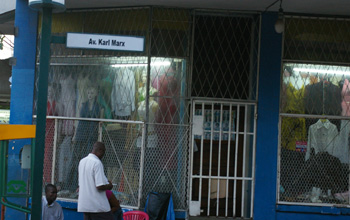 Tosser
Tosser
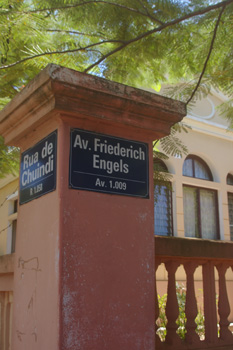
Tosser
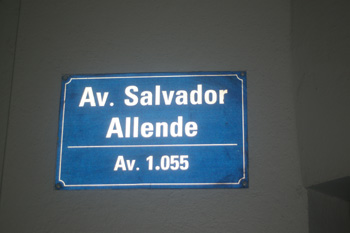
Tosser, although whether Pinochet was a bigger or smaller tosser is a matter for dispute
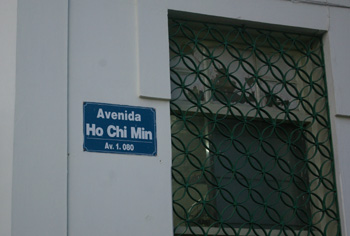
Tosser
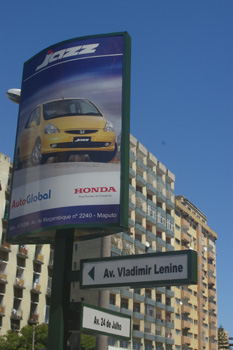
Big tosser, although I suppose we can at least say “Japanese car manufacturers 1. Soviet Union 0”
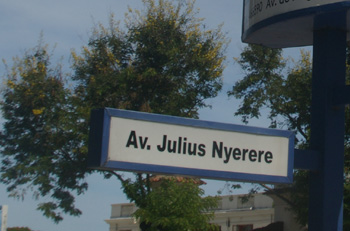
Well, okay, he was at least another African independence leader, and his country has at least managed to remain peaceful, which is more than many can say. He did utterly impoverish it, just the same. Could be worse
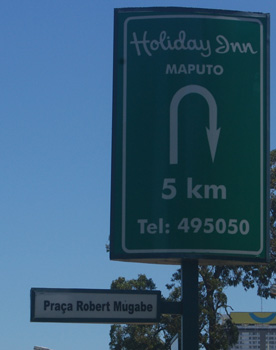
Much worse, in fact.
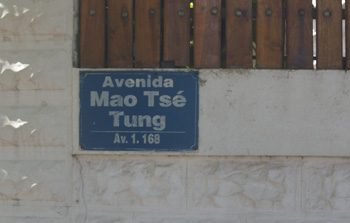
Perhaps we could also have streets named after Hitler and Stalin so that the three great murderers of the 20th century all get equal treatment?
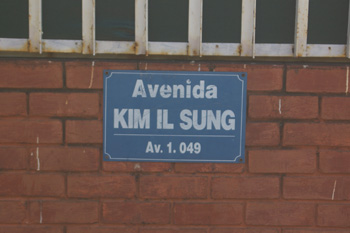
Okay, at this point I think we may have reached the indescribable
There is perhaps one redeeming feature, however. Near the botanic gardens is to be found a statue of Samora Machel, the first post-independence president of Mozambique. As it happens, this statue was given to Mozambique by the North Koreans and Kim Il Sung, which perhaps explains the slightly wacky style.
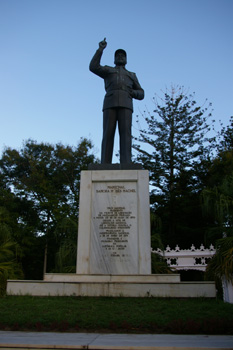
However, the statue hasn’t received much maintenance, and many of the words on the plaque below it have crumbled away. In particular, the whole section explaining when and how the statue was erected is gone, and there appears to have been no attempt to repair the sign and return Mr Kim’s credit. That is something to be thankful of, I suppose.
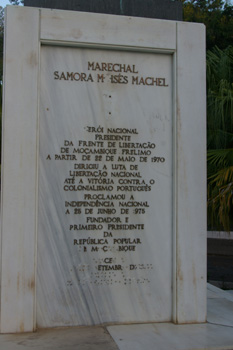




Actually the whole world should look at Zimbabwe as a shining example of what not to do. Inflation there recently hit 1600% and doctors, nurses and teachers are all on strike. Not even Mugabe’s “best mate” Gaddafi is gonna bail them out of the utter chaos which will ensue in what was once one of the richer African nations.
I had no idea the homage was so blatant and widespread. But re-writing history is always pointless. We have streets in Bristol and Liverpool named after the slave traders who funded them, and I’ve never seen why people make such a fuss about it. I like to imagine a country where the rulers are careful enough with public funds that they *don’t* waste them bringing the street names into line with the latest political thought, whatever that may be.
Now, if they want to build a new road and name it ‘Adam Smith Street’, I guess that’s OK. Overall I’d prefer it if our leaders didn’t litter the names of their personal heroes all over our towns and cities, but there you go.
Somewhat related:
Clive James on name changing
One of the sad things that happened in the cold war was that the two sides found themselves allies in the third world
??
Either what this says is not what the author meant, or I am unaware of places where the “two sides” in the Cold War (generally assumed to be the US and its allies vs. the Soviet Union and its satellites) were themselves somehow “allies”.
That aside, the street names remain appropriate, from what I know of African politics. Socialist ideology may have gone out of style, but totalitarianism has not.
Okay, perhaps I was a little ambiguous. “The two sides each found themselves allies” would be less so, and is what I meant.
I am not sure that I agree with your other point though. I think Africa is much less totalitarian than it once was, if the word “totalitarian” implies some officially sanctioned and enforced ideology. There is still plenty of corruption, plenty of bureacracy, plenty of authoritarianism, and plenty of plain bad government, but I think on aggregate it is much less ideological than it once was. Naming streets after dictators from the other side of the word is not done much any more. There is still plenty of legacy (as I am trying to demonstrate), in ideas as well as anything physical, but the present is more pragmatic. Thankfully.
Interesting to see the statues of Kim. Recently reading Bradley K Martin’s “Under the Loving Care of the Fatherly Leader”, I found that North Korea played its own peculiar role in the great game of the Cold War, lavishing agricultural and military aid on a number of African states. In fact, the older Kim was said to have practically supplied the entire Madagascan army. Kind of ironic now given the level of privation that North Koreans endure in order support their own military apparatus. It just goes to show the insane logic of redistributive socialism.
The Honda/Av. Lenine photo is rather marvellous.
I once read somewhere (probably some car mag or other) that there’s a footnote on every Honda press release saying, “The Honda Motor Company operates a policy of refusing state subsidy in every territory in which it operates”, or words to that effect. I always had a soft spot for Honda (it’s one of the few far-eastern car firms founded by a bloke who actually liked to build engines), but I’ve been a huge fan ever since.
Sam: The best thing about Honda is simply the excellence of their vehicles. This is a company that makes really good cars.
Honda is also the autmotive example that demonstrates the essential uselessness of Japanese state industrial policy post war. When Honda decided it wanted to move from motorcycles into car manufacturing in the early 1960s it was told by the Japanese government that it could not do so, as Japan had enough (politically well connected) car manufacturers already and they shouldn’t have to face additional domestic competition. Honda persevered and moved into car making anyway. It ultimately became a huge success despite extensive opposition from a government that had significant control over the industry – a huge achievement.
This is actually quite typical in some ways. The huge and well connected Japanese conglomorates (pre-war zaibatsus evolving into post-war keiretsus) were helped by the government and protected from competition, but although they were important in Japan’s economic development, much of the real innovation came from companies that were founded around the second world war and sort of stepped through the cracks. (In electronics, companies such as Sharp, Seiko-Epson and Canon were far more innovative than the large Toshibas, NECs, and Matsushitas).
Actually, Nyerere’s saving grace is not that he followed a Rothbardian peacenik foreign policy, it’s that he invaded Uganda unilaterally and without provocation in order to depose a demented nutcase and did so swiftly and effetively.
For this action he stands as one of the few African leaders who actually saved more lives than they destroyed (although he did create a famine, btw, he only did so by following the agricultural policies initiated by the Attlee administration post-war. Yet another reason why voting Labour should be a criminal offence).
So the sentence I was tangling with meant “During the Cold War, Third World countries [often] allied with one side or the other”?
Ahh. Okay, that I’d agree with.
I had read it to mean that during that period, the US and Sov Union had “found themselves” to be allies in the Third World. Blame caffeine levels.
Gabrial makes a good point about Nyerera, although he was helped by Amin being stupid enough to invade Tanzania first (although Rothbard would still have found a way to denounce fighting back). Otherwise he would just be known for being another economy smasher, although he was unusually good at getting aid out of virutally every major government on Earth.
Peace was helped by there being so many tribes in Tanzania – there was, I believe, no few big tribes that could each hope to sit on everyone else.
As for the Atlee government. General statism in the colonies (started by the Conservative government before W.W.II. “we do not want a class of Kulaks in africa” said the “conservative” Colonial Secretary Oliver Littleton, hence the 1930’s planning boards and so on.
Of course, it all got worse after the war. As for the Goundnuts Scheme (the Atlee special) my father tried to buy the railway stuff after that scheme fell apart – he had a buyer in Brazil.
However, the British would not let him take the stuff out of the country without an import license from Brazil, and Brazil would not give him an import license without an export license from the British (who would not…..)
People tell me how a man should try and try – but having watched my father work and work, try and try over the decades I sometimes think that the best thing a man can do is cut his own throat (it saves time and irritation).
On Honda:
Yes Mr Honda told M.I.T.I. to keep their noses out of his business when they told him to stick to motorcycles. He was a great man.
It is a great tragedy of historical timing that, as the European empires wobbled after WW1, and collapsed after WW2, so many newly formed nations in Africa and elsewhere should be instituted during the intellectual and political ascendency of the very same collectivist ideology that brought about these disastrous wars to begin with.
It is no accident that the very same intellectual and political leaders who were soaked in marxist/collectivist theory while in various European universities in their formative years returned home to lead “liberation movements” whose basic premises led inexoribly to the replacement of a foriegn group of oppressors with a domestic oppression even more crushing and lethal.
The wasteland that is much of Africa, and the graveyards that constitute much of SE Asia, are the direct results of statism raised to the nth power, and inflicted on an exuberent and inexperienced populace who had been promised heaven when “we” were in power, but who were delivered, instead, into some of the lower rings of hell.
I can forgive the idealist of the late 19th and early 20th century who truly believed that “scientific socialism” and the “unity of the volk” could bring about the construction of a society which would serve as the benefactor of all, existing solely for the “common good”.
That poor, misguided fool had no idea of the horrors he was releasing upon the earth’s peoples, and probably perished somewhere along the way, swept up in another wave of repression, a name on a list which was later misplaced, as was Lara.
What I cannot forgive, and will never accept, is the continuing exhaltation of these very same inhuman theories and corrupt practices, still trumpeted as the salvation of the workers, or the benefactor of the masses, by those for whom there is no longer any excuse, any cover, any but willful ignorance and deliberate “blanking out” of most everything that happened during the calamitous 20th century, when hundreds of millions of our fellow human beings were sacrificed on the altar of the collective.
I can feel the accusing stare of those sightless eyes, and hear the screams of those stilled voices, every time I hear or read some loathsome despots’ claims of benevolent intentions, or the even more craven toadying of this or that collectivist syncophant, writing to praise the glories of Fidel, or the wonders of the “beloved leader”.
I hope for an afterlife for no other reason than the final justice which would exist as the uncounted Lazaruses look down from heavens’ mansions upon these despicable creatures suffering in the lowest, hottest pits of fire.
Meanwhile, I’ll be having apple pie with my grandmother in her neat little bungalow near the throne, purchased with a lifetime of hard work, suffering, and ferocious independence.
Ah, the sweet nectar of cosmic justice, and childlike theology.
I wrote about the street names in Yuzhno-Sakhalinsk back in October when I first arrived.
In fact, I have found myself living on Dzerzhinskogo Street, named for Felix Dzerzhinsky, the founder of what became the NKVD and later the KGB. This same chap saw his statue torn down from its place in Moscow.
I like the picture of the Honda ad. against the Lenin sign. Possibly the best juxtaposition of Lenin and capitalism is in Yalta, where his statue nowadays looks directly at a thriving McDonalds.
Sorry, obviously the invasion of Uganda wasn’t without provocation, but Nyerere didn’t have international sanction to turn a defensive war into an offensive one, or depose the government. He did anyway. He also probably did in some way provoke Amin by illegally providing support to opponents of his ‘government’.
Good for him, may he rest in peace.
On the subject of statues, this Lenin statue should stay. Note the inscription.
The wife and I stayed at the Polana Hotel when it was in Lourenco Marques in Sept. 1971. It was a beautiful hotel, as well as the site of our introduction to the wonderful “Dos M” beer.
The jacaranda-lined streets were very wide, and then also had elaborate long names (but, in Portuguese). The Avenida do 24 (?) Julio (seen at bottom in the Honda pic) was one of the main drags.
When the climate here in the states is pleasant, we say, “We’re having Rhodesian weather”.
Too bad that Mugabe and his henchmen have ruined the place.